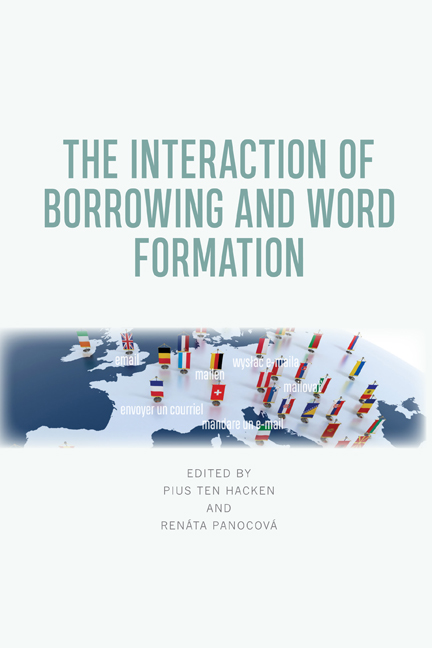Book contents
- Frontmatter
- Contents
- List of Figures and Tables
- List of Contributors
- Preface
- List of ISO-639 Language Codes
- Introduction
- 1 Word Formation, Borrowing and their Interaction
- Part I Compounding
- 2 Compounding and Contact
- 3 Neoclassical Compounds between Borrowing and Word Formation
- 4 Borrowed Compounds, Borrowed Compounding – Portuguese Data
- 5 Compound Calques in an Eighteenth-Century German-Lithuanian Dictionary
- 6 (Pseudo-)Anglicisms as Nominal Compounds in Italian
- Part II Affixation
- 7 The Role of Borrowing in the Derivation of Passive Potential Adjectives in Polish
- 8 How an ‘Italian’ Suffix Became Productive in Germanic Languages
- 9 The Suffixes -ismus and -ita in Nouns in Czech
- 10 The Interaction between Borrowing and Word Formation: Evidence from Modern Greek Prefixes
- Part III Naming in Minority Languages
- 11 Loanword Formation in Minority Languages: Lexical Strata in Titsch and Töitschu
- 12 Examining the Integration of Borrowed Nouns in Immigrant Speech: The Case of Canadian Greek
- 13 Interaction among Borrowing, Inflection and Word Formation in Polish Medieval Latin
- Conclusion
- 14 Trends in the Interaction between Borrowing and Word Formation
- Author Index
- Subject Index
3 - Neoclassical Compounds between Borrowing and Word Formation
Published online by Cambridge University Press: 22 September 2020
- Frontmatter
- Contents
- List of Figures and Tables
- List of Contributors
- Preface
- List of ISO-639 Language Codes
- Introduction
- 1 Word Formation, Borrowing and their Interaction
- Part I Compounding
- 2 Compounding and Contact
- 3 Neoclassical Compounds between Borrowing and Word Formation
- 4 Borrowed Compounds, Borrowed Compounding – Portuguese Data
- 5 Compound Calques in an Eighteenth-Century German-Lithuanian Dictionary
- 6 (Pseudo-)Anglicisms as Nominal Compounds in Italian
- Part II Affixation
- 7 The Role of Borrowing in the Derivation of Passive Potential Adjectives in Polish
- 8 How an ‘Italian’ Suffix Became Productive in Germanic Languages
- 9 The Suffixes -ismus and -ita in Nouns in Czech
- 10 The Interaction between Borrowing and Word Formation: Evidence from Modern Greek Prefixes
- Part III Naming in Minority Languages
- 11 Loanword Formation in Minority Languages: Lexical Strata in Titsch and Töitschu
- 12 Examining the Integration of Borrowed Nouns in Immigrant Speech: The Case of Canadian Greek
- 13 Interaction among Borrowing, Inflection and Word Formation in Polish Medieval Latin
- Conclusion
- 14 Trends in the Interaction between Borrowing and Word Formation
- Author Index
- Subject Index
Summary
Neoclassical compounds are words like microscope. They are complex in the sense that they consist of more than one basic component, but these components are taken from the classical languages, Latin and Greek. In the case of microscope, the Ancient Greek μικρός (‘small, little’) and σκοπέω (‘examine’) provide the components. Given the meaning of microscope, it is obvious that the word was not borrowed as an Ancient Greek compound, but combined from the components in modern languages. OED (2019 [2001]: microscope (n.)) gives its origin as a borrowing from Italian in the seventeenth century.1 In this chapter, we address a number of issues regarding the interaction of borrowing and word formation as reflected in neoclassical compounds and argue for a model of historical development of neoclassical word formation. In section 1, we consider the nature of languages as they interact in borrowing and develop in word formation. Section 2 turns to the issue of naming as the main trigger for both borrowing and word formation. Against this background, we outline the model we propose in section 3. Section 4 explores the consequences of this model and gives evidence supporting it. Section 5 is a brief conclusion.
Language and languages
One of the immediate problems confronted in early studies of language was determining what exactly was the object of study. Saussure (1916) discusses this question systematically and arrives at the conclusion that the unit of study should be the langue, i.e. the language system used by a speech community. He calls this ‘un objet de nature concrète’ (1916: 32), i.e. an empirical object. In this view, individual languages such as English, Dutch and Slovak are the objects of study. This idea is still popular in (certain currents of) lexicography. A problem is that it is often difficult to ascertain what expressions belong to the language. This is particularly relevant in studies such as the one we present here, where the question is whether specific neoclassical compounds and the underlying system for creating them are part of a language or not.
An alternative view, which emerged as a reaction to the problems of determining what is actually part of a language, has its origin in Bloomfield (1933) and is presented in a radical, systematic way by Harris (1951).
- Type
- Chapter
- Information
- The Interaction of Borrowing and Word Formation , pp. 32 - 48Publisher: Edinburgh University PressPrint publication year: 2020



